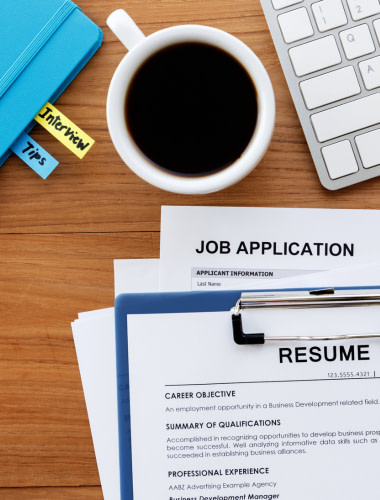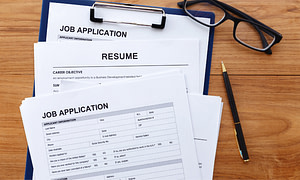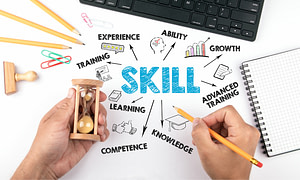This article is recommended for individuals near the beginning of their careers

The importance of punctuality
Having spent years in the field of recruitment, I have seen countless candidates fail to impress due to arriving late to a job interview. Ultimately, many of these candidates miss out on landing the job, despite having the right skills and experience.
Being on time to a job interview is crucial for several reasons, and it reflects positively on your professionalism and reliability. Here are some key reasons why punctuality is important in the context of a job interview.
First impressions matter
Punctuality is one of the first things an interviewer notices about a candidate. Arriving on time creates a positive first impression and sets the tone for the rest of the interview.
Professionalism
Being on time demonstrates that you take the opportunity seriously and respect the interviewer's time. Employers value candidates who display professionalism and understand the importance of punctuality in a work setting
Reliability & responsibility
Punctuality is often seen as a sign of reliability and responsibility. Employers want to hire individuals who can be trusted to meet deadlines and fulfill their job responsibilities. Arriving on time for an interview is a small but significant way to showcase these qualities.
Stress reduction
Arriving early allows you to compose yourself and reduce any stress or anxiety before the interview. It gives you time to review your notes, calm your nerves, and enter the interview room with confidence.
Time management skills
Punctuality is indicative of good time management skills. Employers value candidates who can effectively manage their time to meet deadlines and complete tasks efficiently.
Respect for others
Being on time is a way of showing respect for the interviewer's schedule. Employers appreciate candidates who understand the value of time and are considerate of others' commitments.
Demonstrates enthusiasm
Arriving on time signals your enthusiasm for the job. It shows that you are eager to engage in the interview process and are genuinely interested in the position.
Avoids negative impression
Being late to an interview can create a negative impression that is hard to overcome. It may make the interviewer question your commitment, reliability, and overall suitability for the position.
Sets a positive tone
Punctuality sets a positive tone for the interview, contributing to a more favorable overall experience. It helps create a professional and organised atmosphere, making it easier for both you and the interviewer to focus on the discussion at hand.
In summary, being on time to a job interview is a simple yet effective way to demonstrate your professionalism, reliability, and respect for others' time. It contributes to a positive first impression and sets the stage for a successful interview experience.


How to avoid being late
Being punctual for a job interview is crucial as it reflects your professionalism and respect for the employer's time. Here are some tips to help you avoid being late.
Plan ahead
Research the location of the interview in advance. Know the route you'll be taking, including any public transportation or parking options.
Test the route
If possible, do a trial run of the route a day or two before the interview to gauge traffic conditions and estimate travel time accurately.
Check transport options
If you're relying on public transportation, check schedules and potential delays. Consider alternative routes in case of unexpected issues.
Account for potential delays
Factor in extra time for unexpected delays, such as traffic, public transportation delays, or parking issues.
Prepare the night before
Lay out your interview attire and gather all necessary documents the night before to avoid any last-minute rushes.
Set multiple alarms
Set multiple alarms on the morning of the interview to ensure you wake up on time.
Have a backup plan
Identify a backup plan in case your primary mode of transportation fails. For example, have the contact information for a taxi service or a reliable friend who can provide a last-minute ride.
Check the weather
Be aware of weather conditions that might affect your commute. Plan for extra time if there's rain, snow, or other adverse weather conditions.
Notify someone in advance
If you encounter an unexpected delay, contact the interviewer or the company's HR representative as soon as possible to inform them of the situation.
Be mindful of time zones
If you're traveling to a different time zone, double-check the time difference and adjust your schedule accordingly.
Use technology
Utilise navigation apps with real-time traffic updates to help you navigate efficiently.
Practice good time management
Develop a habit of managing your time well in general. This can help you avoid last-minute rushes and ensure you allocate enough time for all tasks.
Remember, being punctual not only helps you make a positive impression but also sets a professional tone for the entire interview process. If, despite your best efforts, you find yourself running late due to unforeseen circumstances, communicate this promptly and professionally to the interviewer.
To ensure a seamless interview day, I also recommend that you reach out to the interviewer before the interview day via text or email. Confirm your attendance and convey your excitement for the upcoming meeting. This small gesture demonstrates your respect for their time and your genuine interest in the role.
What to do if you're running late
If you find yourself running late for a job interview, it's essential to handle the situation professionally and communicate effectively. Here's a step-by-step guide on what to do.
Call or email immediately
Contact the company as soon as you realise you will be late. Find the contact information from your interview invitation or the HR representative you've been in touch with. Be honest and provide a brief explanation for your delay. Apologise sincerely and express your commitment to attending the interview.
Provide an estimated arrival time
Give the interviewer an estimate of when you expect to arrive. This can help them make decisions about rescheduling or adjusting the interview process.
Explain the situation briefly
If there's a specific reason for your delay (e.g., transportation issues, unexpected traffic, etc.), briefly explain it without going into unnecessary details. Keep it professional.
Offer to reschedule
Express your willingness to reschedule the interview if that's more convenient for the interviewer. This demonstrates your commitment to the opportunity and respect for their time.
Prepare for adjustments
Be ready to adapt to any changes the interviewer suggests. This might include a modified interview format or a different meeting location.
Apologise again in person
When you arrive, apologise again in person. Keep it brief, professional, and focus on moving forward positively.
Maintain professionalism
Despite the delay, maintain a professional demeanor throughout the interview. Show that you can handle unexpected situations with grace and composure.
Learn from the experience
After the interview, regardless of the outcome, use the experience as a learning opportunity. Plan better for future interviews, leaving with plenty of time to spare.
Remember, unforeseen circumstances can happen to anyone, and interviewers may understand if you handle the situation with professionalism and courtesy. However, it's crucial to make every effort to prevent lateness and manage your time effectively in the first place.
If you find yourself in a situation where you're running late and unsure of what to say, you can click the button below to download our phone script.


What to do if you're running early
Being early to a job interview is generally a positive thing, as it demonstrates punctuality and eagerness. Here are some suggestions on what to do if you find yourself with extra time before your interview.
Review your preparation
Take a few moments to review key points about the company, the role you're applying for, and any other relevant information. Go over your resume and the job description to refresh your memory.
Relax & stay calm
Use the time to calm your nerves and focus on presenting your best self during the interview. Take a few deep breaths or practice mindfulness to help manage any anxiety.
Observe the workplace environment
Pay attention to the workplace environment. This can give you insights into the company culture and may provide you with conversation points during the interview.
Check your appearance
Use the extra time to make sure your appearance is neat and professional. Check your clothes, hair, and accessories. Visit the restroom to freshen up if needed.
Review your questions
Revisit any questions you plan to ask the interviewer. It's essential to have thoughtful questions to demonstrate your interest in the position and the company.
Arrive at the reception or waiting area
Approach the reception or waiting area about 10-15 minutes before the scheduled interview time. Be polite and professional with the receptionist or any staff you encounter.
Turn off your phone
Ensure your phone is turned off or set to silent mode before entering the building or the interview room.
Be ready to engage
Be prepared to engage in small talk with the interviewer or any staff you encounter. Be polite and professional in all interactions.
Use the time for networking
If you have an opportunity to speak with employees while waiting, use it as a chance to network and gain insights about the company.
Stay positive & confident
Keep a positive mindset and maintain confidence in your abilities. Believe in yourself and your qualifications for the position.
Remember, the goal is to make a positive impression even before the formal interview begins. Being early allows you to start the interview on a good note and demonstrates your professionalism.
How running late can damage your career
Punctuality is crucial in shaping your professional trajectory. It's not just about making that initial interview impression; it's about consistently demonstrating your commitment by being on time every day.
Running late for work chronically can have several negative impacts on your career. While occasional lateness may be understandable, chronic tardiness can lead to serious consequences. Here are some ways it can damage your career.
Perception & professionalism
Chronic lateness can create a negative perception of your professionalism. Punctuality is often seen as a sign of reliability and respect for others' time. Consistently arriving late may lead colleagues and supervisors to question your commitment to your job.
Missed opportunities
Being late can cause you to miss important meetings, deadlines, or other critical opportunities. This can affect your ability to contribute to projects, stay informed about company developments, and collaborate effectively with your team.
Decreased productivity
Chronic lateness can impact your productivity and that of your team. If you're consistently arriving late, it may disrupt team meetings or cause delays in project timelines, affecting overall productivity.
Damaged relationships
Punctuality is a sign of respect for your colleagues' time. Chronic lateness can strain relationships with coworkers and supervisors, as they may feel that your tardiness shows a lack of consideration for their schedules and priorities.
Reputation damage
Over time, chronic lateness can damage your professional reputation. Colleagues and supervisors may come to associate you with unreliability, which can hinder your chances of advancement or getting important assignments.
Disciplinary actions
Many workplaces have policies regarding punctuality, and chronic lateness may result in disciplinary actions. This could include verbal or written warnings, performance evaluations, or even termination if the issue persists.
Stress & anxiety
Chronic lateness can lead to increased stress and anxiety, both for you and your colleagues. Constantly rushing to catch up can negatively impact your mental well-being and hinder your ability to perform at your best.
Missed learning opportunities
Arriving late may cause you to miss important information shared at the beginning of meetings or training sessions. This lack of information can hinder your ability to fully understand and contribute to discussions and projects.
Limited advancement opportunities
Punctuality is often associated with professionalism, and consistently being late may limit your chances of being considered for promotions or advancement opportunities.

How to address chronic lateness
First and foremost, it's vital to confront the problem head-on. even if the reasons for tardiness are valid, a recurring pattern of lateness without explanation can seriously tarnish your standing within the organisation. This calls for a candid conversation with your superior, where you openly discuss the root causes behind your consistent lateness.
Next, seek out viable solutions. Modern workplaces are progressively embracing flexibility in employees' start and end times. This grants you an opportunity to modify your schedule - perhaps an early start or a later finish - or even explore options like shorter breaks or transitioning to part-time hours. Grieve stresses the importance of framing this proposal with the company's well-being in mind, showcasing that you're attuned to the broader impact of your choices.
Once a potential solution is on the table, it's advisable to test the waters. Communication is key here: ensure that your colleagues and superiors are fully aware of your new working hours. This trial period allows you to smoothly acclimate to the adjusted arrangement while also giving others the chance to adapt.
In essence, tackling issues such as chronic lateness requires proactive and transparent communication, coupled with a sincere commitment to finding a workable solution. By following this guidance, you can prevent a minor hiccup from ballooning into a major career obstacle, safeguarding your professional journey along the way.


Are you looking for a job?
Now that you know what to do if you're running late for an interview, you should take a moment to check our current vacancies page.
At 11 Recruitment, we have a range of white-collar temp and perm jobs available. We're always on the lookout for top talent to place with our clients, so we encourage you to apply for any positions that are of interest.
If none of our current vacancies are right for you, you should register for job alerts. Then we’ll be able to notify you when we receive a position that matches your profile.

What are your thoughts?
I'd love to have a conversation with you about this topic - please leave a comment below if you have any thoughts or opinions 🙂
Christian Madsen
Managing Director of 11 Recruitment





















Fantastic article – thanks for the practical tips 🙂
In your experience as someone in the field of recruitment, can you give an example of a time where a candidate successfully recovered from arriving late to an interview and still managed to make a positive impression?
Thanks for your comment, Richard! I’m glad to hear you enjoyed the article 🙂
Certainly – I’ll provide an example below of a candidate one of our consultants recently interviewed. I’ll refer to the candidate as “Sarah”.
Sarah had an interview scheduled at our office for a position with our client, a leading advertising agency. Unfortunately, due to unexpected traffic delays, she arrived 15 minutes late for her interview.
Upon entering the office, Sarah approached reception and apologised sincerely. She was informed that the consultant was aware of the delay and would still see her for the interview.
Sarah composes herself before entering the interview room. When she walked in, she greeted the consultant with another sincere apology.
Instead of dwelling on the lateness, Sarah quickly shifted the focus to her qualifications and passion for the role. She began by expressing her genuine enthusiasm for the company and her excitement about the potential to contribute to its success.
To further demonstrate her commitment, Sarah prepared a brief presentation on a successful marketing campaign she had previously spearheaded. Despite the late start, she seamlessly incorporated the presentation into the interview, showcasing her creativity, strategic thinking, and results-driven approach.
Throughout the interview, Sarah remained composed and confident, answering questions with clarity and providing specific examples of her achievements. She took the opportunity to address her punctuality directly, explaining that the delay was an unusual circumstance and not reflective of her usual professional conduct.
As the interview progressed, we were impressed by Sarah’s skills, her ability to handle unexpected situations, and her proactive approach to addressing the lateness issue. By the end of the interview, the initial concern about her tardiness had been overshadowed by her qualifications and the positive impression she had left.
Wisdom ! Proactive advice not only for Job Seekers but any face to face business activity between professionals …
Hi Robbie, thanks for the feedback! I’m glad to hear you found it useful 🙂